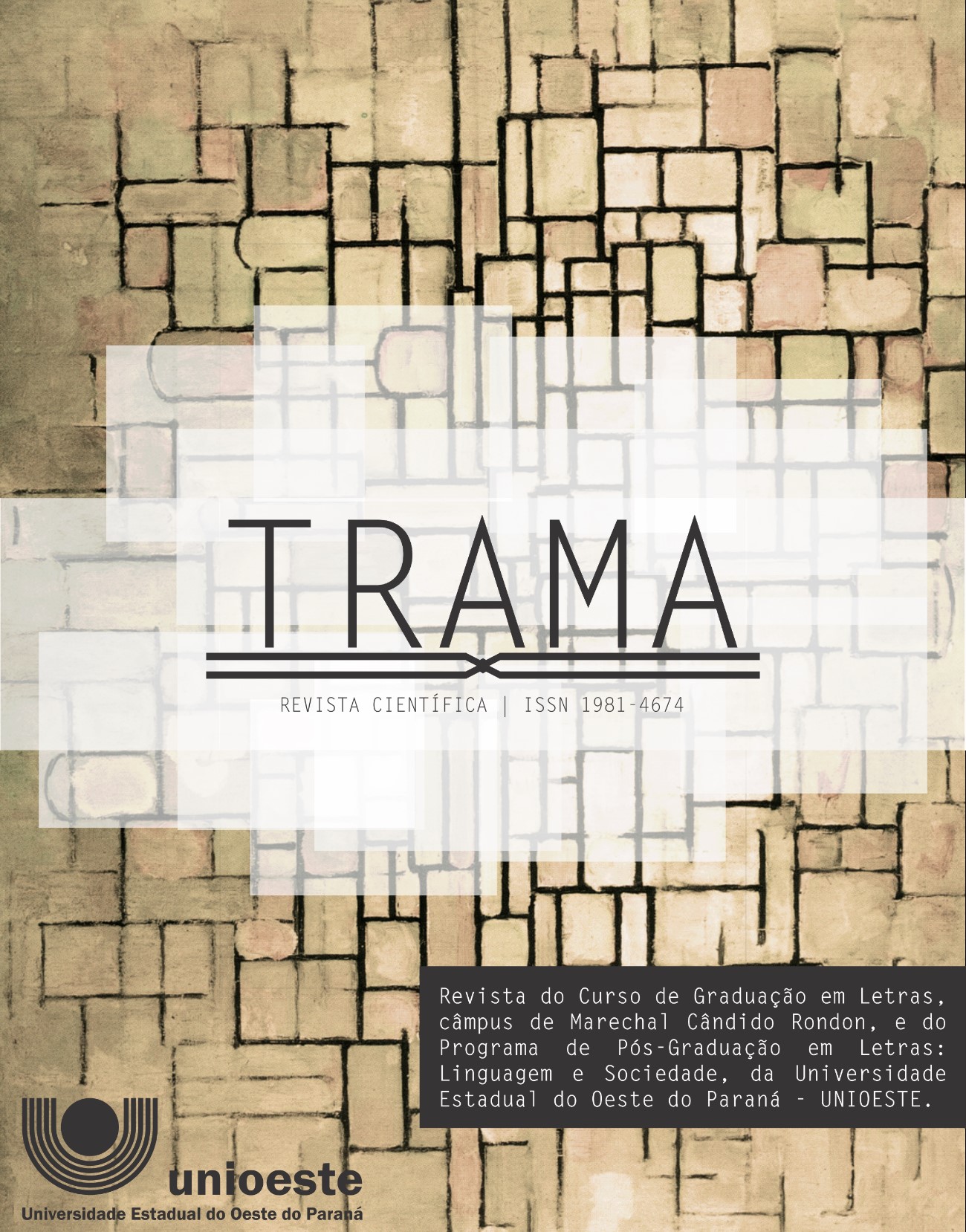A VISÃO TRANS-HISTÓRICA DE MIKHAIL BAKHTIN SOBRE A ESTÉTICA DO GROTESCO, EM A CULTURA POPULAR NA IDADE MÉDIA E NO RENASCIMENTO: O CONTEXTO DE FRANÇOIS RABELAIS, E O ESPÍRITO CARNAVALESCO DE SHAKESPEARE, EM SONHO DE UMA NOITE DE VERÃO
DOI:
https://doi.org/10.48075/rt.v18i44.29449Keywords:
Bakhtin, Cômico, Grotesco, Organicidade, ShakespeareAbstract
This study presents Bakhtin’s transhistorical approach toward different views imposed to the aesthetics of the grotesque. Moreover, I pursue a comprehension between the concepts of beautiful and ugly focusing on their universal and balanced connection. This holistic perspective of the aesthetics leads us to the understanding of the genesis of the spirit of carnival as proposed by Bakhtin in Popular culture in the Middle Ages and Renaissance: The context of François Rabelais. Since Bakhtin uses Rabelais in the application of his theories, I make use of the famous scene from the Shakespearean comedy A Midsummer Night's Dream, which the love affair between the Fairy Queen Titania and Bottom - in the shape of an ass - is displayed, in order to explore how the carnival’s mindset reverberated in Renaissance, and more precisely, how Shakespeare adapts this particular comedy into popular folklore and provides them meaning. Towards the end, I build a parallel between life and art, showing that the transhistorical study of grotesque realism can actually bring to the aesthetic sense a genuine liberation from moral imperatives.
References
BAKHTIN, M. A cultura popular na Idade Média e no Renascimento: o contexto de François Rabelais. Tradução de Yara Frateschi Vieira. São Paulo: Hucitec, 1987.
BLOOM, H. A Midsummer Night’s Dream. In: BLOOM, H. Shakespeare – The Invention of the Human. New York: Riverhead Books, 1998. p. 148-170.
CURTIUS, E. R. Classicismo. In: CURTIUS, E. R. Literatura Europeia e Idade Média Latina. Tradução de Teodoro Cabral e Paulo Rónai. São Paulo: Hucitec, 1996. p. 313-340.
ECO, U. The Beauty of Monsters. In: ECO, U. On Beauty. London: Secker & Warburg, 2004. p. 131-153.
ECO, U. The Ugly, the Comic, the Obscene. In: ECO, U. On Ugliness. London: Harvill Secker, 2007. p. 131-158.
EMERSON, C. On Mikhail Bakhtin and human studies (with continual reference to Moscow and Sheffield). Russian Journal of Communication. p.1-23, jun/2017. Disponível em: http://dx.doi.org/10.1080/19409419.2017.1321437. Acesso em: 02 ago. 2021.
FOUCAULT, M. Classificar. In: FOUCAULT, M. As Palavras e as Coisas: uma arqueologia das ciências humanas. Tradução de Salma Tannus Muchail. 9. ed. São Paulo: Martins Fontes, 2007. p. 171-226.
FOUCAULT, M. O homem e seus duplos. In: FOUCAULT, M. As Palavras e as Coisas: uma arqueologia das ciências humanas. Tradução de Salma Tannus Muchail. 9. ed. São Paulo: Martins Fontes, 2007. p. 417-474.
FRYE, N. Anatomia da crítica. Tradução de Péricles Eugênio da Silva Ramos. São Paulo: Cultrix, 1957.
HEERS, J. Fêtes, Jeux et Joutes dans les Sociétés d’Occident à la Fin du Moyen Âge. Quebec: Bibliothèque nationale du Québec, 1971.
KNOWLES, R. Introduction. In: KNOWLES, R. (Ed.). Shakespeare and Carnival: After Bakhtin. London: Macmillan Press, 1998. p. 1-12.
LE GOFF, J. O homem medieval. Tradução de Maria Jorge Vilar de Figueiredo. Lisboa: Presença, 1989.
PAZ, O. “O mundo heroico”. In: PAZ, O. O Arco e a Lira. Tradução de Olga Savary. Rio de Janeiro: Nova Fronteira, 1982. p. 241-266.
SANT’ANNA, A. R. Paródia, Paráfrase e Cia. 7. ed. São Paulo: Ática, 2003.
SHAKESPEARE, W. A Midsummer Night's Dream. Edited by R. A. Foakes. United Kingdom: Cambridge University Press, 2003. (The New Cambridge Shakespeare).
SHAKESPEARE, W. Sonho de uma noite de verão. In: SHAKESPEARE, W. William Shakespeare – Teatro completo: comédias e romances. Tradução de Bárbara Heliodora. São Paulo: Nova Aguilar, 2016. p. 306-385.
SOUZA NETTO, F. B. Do sagrado ao lúdico: A festa do asno. Revista Trans/Form/Ação. v. 21/22, p. 22-26, 1998/1999. Disponível em: https://www.scielo.br/j/trans/a/34h68GhkkWTWJDWRzrzvQcc/?lang=pt. Acesso em: 27 maio 2021.
Downloads
Published
How to Cite
Issue
Section
License

This work is licensed under a Creative Commons Attribution-NonCommercial-ShareAlike 4.0 International License.
Aviso de Direito Autoral Creative Commons
Política para Periódicos de Acesso Livre
Autores que publicam nesta revista concordam com os seguintes termos:
1. Autores mantém os direitos autorais e concedem à revista o direito de primeira publicação, com o trabalho simultaneamente licenciado sob a Licença Creative Commons Attribution que permite o compartilhamento do trabalho com reconhecimento da autoria e publicação inicial nesta revista.2. Autores têm autorização para assumir contratos adicionais separadamente, para distribuição não-exclusiva da versão do trabalho publicada nesta revista (ex.: publicar em repositório institucional ou como capítulo de livro), com reconhecimento de autoria e publicação inicial nesta revista.
3. Autores têm permissão e são estimulados a publicar e distribuir seu trabalho online (ex.: em repositórios institucionais ou na sua página pessoal) a qualquer ponto antes ou durante o processo editorial, já que isso pode gerar alterações produtivas, bem como aumentar o impacto e a citação do trabalho publicado (Veja O Efeito do Acesso Livre).
Licença Creative Commons
Esta obra está licenciada com uma Licença Creative Commons Atribuição-NãoComercial-CompartilhaIgual 4.0 Internacional, o que permite compartilhar, copiar, distribuir, exibir, reproduzir, a totalidade ou partes desde que não tenha objetivo comercial e sejam citados os autores e a fonte.


